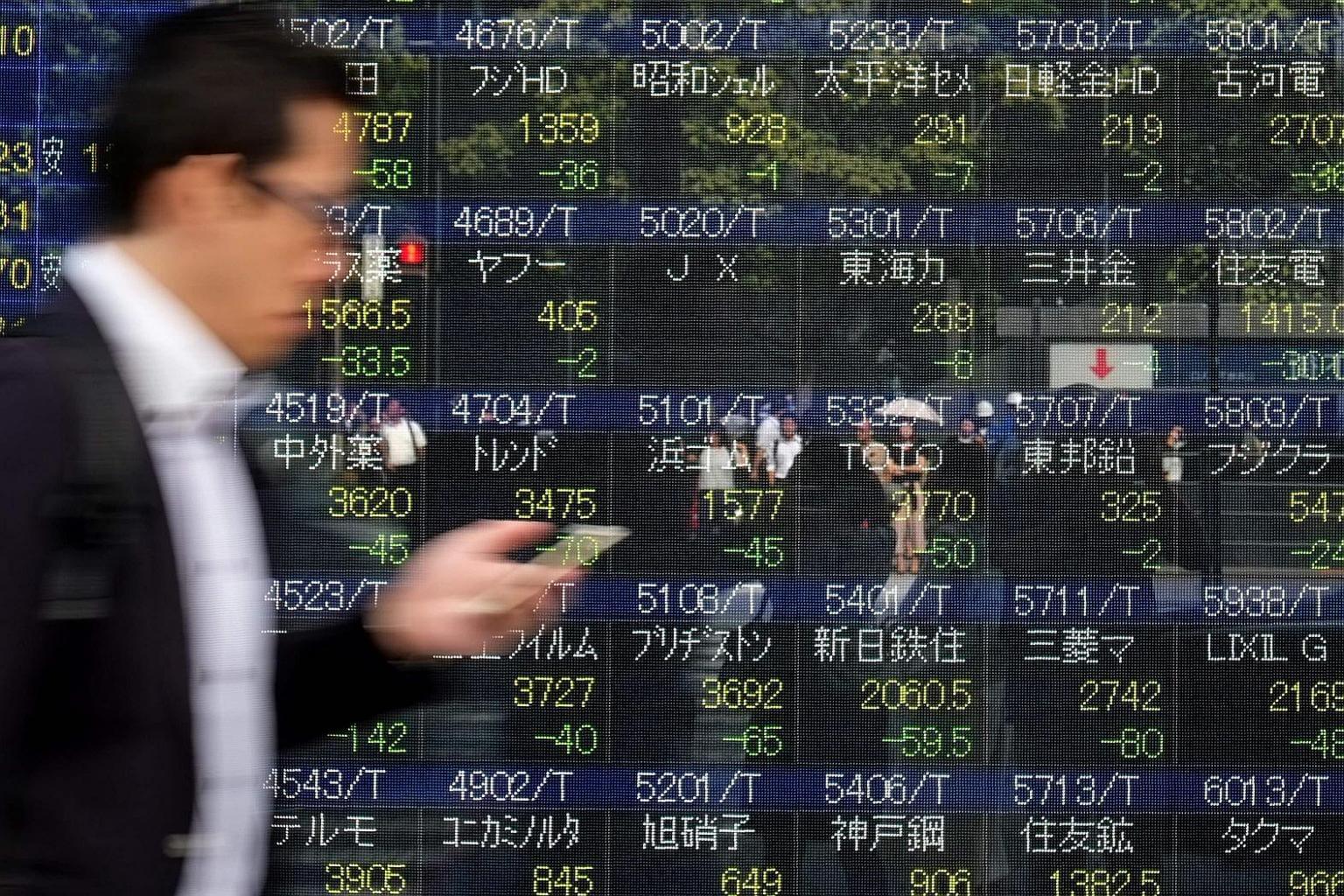Asian stocks slide amid Deutsche Bank jitters, STI down 0.9%
Sign up now: Get ST's newsletters delivered to your inbox

Pedestrians walk in front of an electronics stock display in the window of a securities company in Tokyo on Sept 30, 2016.
PHOTO: AFP
Follow topic:
HONG KONG/KUALA LUMPUR (BLOOMBERG) - What's set to be the best quarter for Asian stocks since 2012 is ending on a sour note as concern about the financial health of Germany's biggest lender unnerves investors, fueling demand for haven assets including the dollar, gold and sovereign bonds.
Financial shares were the biggest drag on the MSCI Asia Pacific Index after Deutsche Bank slid to a record low in the US as Bloomberg News reported that some hedge funds have cut their exposure to the lender.
The MSCI Asia Pacific Index dropped 0.9 per cent as of 11:18 am Tokyo time, trimming its quarterly advanced to 8.6 per cent. Financial stocks accounted for more than a quarter of the decline in the benchmark.
"Whenever there's news of clients moving their assets, there are possibilities of a chain reaction," said Hideyuki Ishiguro, a senior strategist at Daiwa Securities Co. in Tokyo. "If there's a chain reaction among European financial institutions due to mutual distrust, the movement of capital could slow down, creating a negative effect on the economy through banks' reluctance to lend."
Japan's Topix index and Hong Kong's Hang Seng Index fell more than 1 per cent, leading losses among Asian benchmarks. The latter remains Asia's best performer of the quarter with a 13 per cent advance. Markets in mainland China are shut next week for National Day holidays.
Singapore's Straits Times Index was down 0.92 per cent to 2,859.17 as of 11:28 am.
Futures on India's NSE Nifty 50 Index fell 0.5 per cent in Singapore. Indian shares dropped on Thursday by the most in three months after the nation said it attacked terrorist camps in Pakistan, escalating tensions between the two nuclear-armed neighbors. The countries have fought three wars since they split from each other in 1947.
Futures on the S&P 500 slipped 0.3 per cent after the underlying index declined 0.9 per cent on Thursday. Wells Fargo & Co and JPMorgan Chase & Co slumped more than 1.5 per cent, while US-traded shares of Deutsche Bank tumbled 6.7 per cent. About 10 hedge funds that do business with the German lender moved part of their listed derivatives holdings to other firms this week, according to an internal bank document seen by Bloomberg News.
Deutsche Bank's woes are coming to the fore just as Opec's deal calms concern about a global oil glut after central bank meetings last week bolstered confidence that monetary policies in the US and Japan will remain loose.
The German lender's shares have more than halved in value this year amid speculation it will struggle to pay legal bills tied to past misconduct, including a request for US$14 billion from the US Department of Justice. The International Monetary Fund said in June that Deutsche Bank may be the biggest contributor to systemic risk among the largest financial companies.
"Deutsche certainly weighs on sentiment, and the declines are concerning," said James Woods, a strategist at Rivkin Securities in Sydney. "Being named the number one bank for global systemic risk, it's entwined with everyone."
Meanwhie, Japanese data on Friday showed consumer prices fell for a sixth month in August, underscoring the central bank's challenge as it tries to spur 2 per cent inflation and reflate the economy. Industrial production made a modest gain, while household spending slumped and the jobless rate held near the lowest since 1995.
The Bloomberg Dollar Spot Index rose 0.1 pervcent and South Korea's won was the biggest loser among major currencies with a 0.5 pervcent drop. The Japanese yen was little changed and set to complete a third quarterly gain.
Crude oil fell 0.3 pervcent to US$47.68 a barrel in New York, after gaining more than 7 pervcent over the last two days. While Wednesday's agreement among Organization of Petroleum Exporting Countries imposed an overall production cap on the group of 14 oil producers, it didn't assign individual limits - that was left to a committee that will report back at OPEC's next meeting in November.

